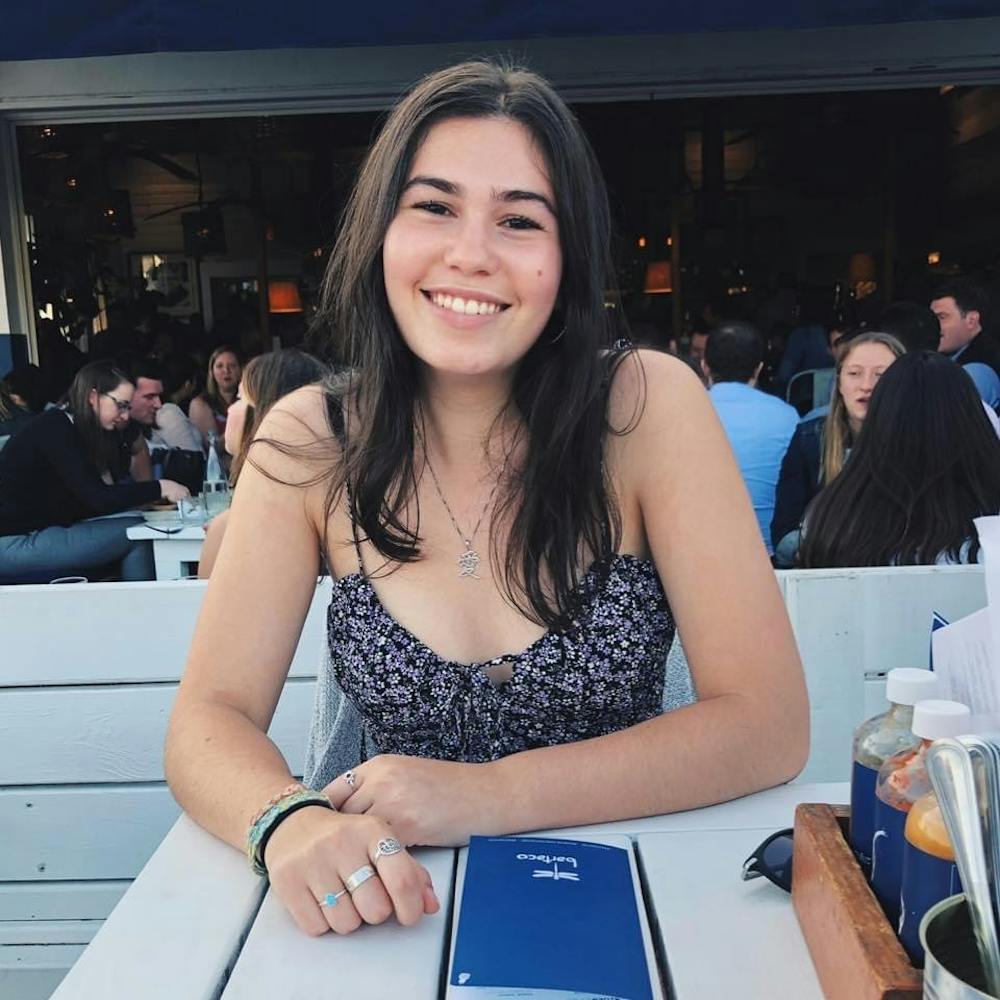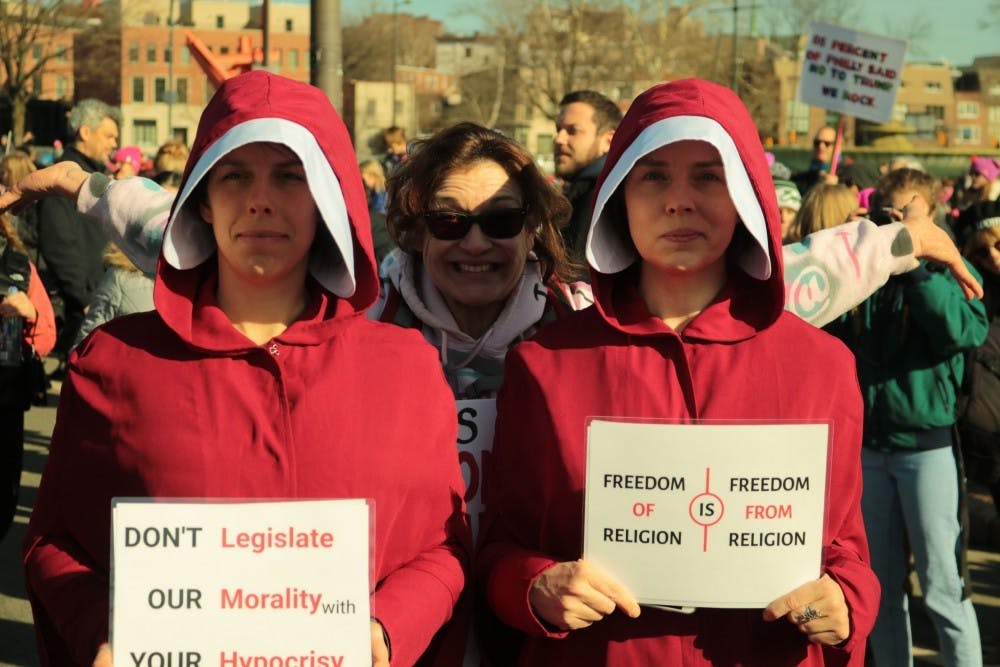In the fall of 2019, Rachel Harris (C '23) followed the official Instagram account of “Stitch it to the Patriarchy.” The brand sold thrifted clothing with a twist, featuring an assortment of sweaters, hats, and shirts—all embroidered with politically charged messages in angled backstitch. Rachel’s friend had recently begun working for the brand, and the ethos of “Stitch–It,” as it is referred to colloquially, appealed to her: “I thought it was really cute, and so I ordered a couple of shirts."
A year later, amidst the onset of the global pandemic, she received a direct message from founder Nina Harris through the account. “Nina DM’ed me … because I was ordering another shirt, and she said ‘I know you go to Penn, you’d be a great fit for this, you should definitely apply.'"
Rachel, along with Marissa Ephron (C '22), both applied to be campus representatives through Stitch–It’s summer recruitment process. After submitting a written application and interviewing, they were both selected to lead Stitch–It’s Penn chapter for the upcoming year.

Rachel Harris (C '23)

Marissa Ephron (C '22)
Originally, Stitch–It was confined to Tulane’s campus and acted as “an embroidery brand … and kind of an activism offshoot,” says Marissa. “It was a team of girls—some were stitching—and they thrifted and then upcycled the clothes. It was a business with a social impact. A percentage of proceeds went towards different nonprofits, mutual aid funds, and things like that.” Followers of the Stitch–It Instagram had the opportunity to choose where those proceeds went, and were able to select organizations for donation.
In the summer of 2020, however, things changed. “The founder wanted to branch out, and before she graduated, [she] started this expansion program,” says Marissa. At the time, the company had gained a large following and began reaching out to their followers on different campuses to extend their reach.
Now, Stitch–It has 13 chapters across the nation. Their official mission statement highlights two generalized areas: grassroots activism efforts and sustainable clothing.
Both Rachel and Marissa acknowledge the broad spectrum of the brand’s goals. “The purpose of the organization at Penn is to be a space for progressive activism and grassroots organizing for any progressive issue. We focus on issues across the progressive platform,” says Rachel. This versatility affords Stitch–It a rare kind of flexibility when it comes to activism. Marissa indicates that the organization’s adaptability is what drove her to join, saying, “I really like how they don’t have just one focus. It’s the ability to shift to whatever is the pressing or urgent need for the community and the nation at large is what I really thought was cool.”
As far as hands–on projects go, Stitch–It is just about as ambidextrous as it gets. Last semester, members of Stitch It at Penn spent two separate Sundays canvassing North and West Philadelphia as part of a voter information drive. “We walked around west of campus and north of campus on separate days to hand out information packets we put together,” Rachel says. The information packets consisted of pre–addressed envelopes to City Hall, a voter registration application, a mail–in ballot application, and a two–sided piece of paper detailing instructions for voting by mail and in person, as well as explaining different parts of the ballot. “We were able to hit hundreds of houses,” says Rachel, “It was awesome.”
As the pandemic has worsened, Stitch–It has gone completely virtual like many other organizations. Marissa describes how she and Rachel have worked to create graphics centered around pressing issues, such as domestic violence in COVID–19, Walter Wallace Jr.'s shooting, and sustainability at home. Moving forward, she says, they’re thinking about a way to “use the Stitch–It platform to reward people who are showing their commitment to conservation.”
Rachel says that Stitch–It’s intersectionality places it in a unique position at Penn: “There’s a lack of groups like Stitch–It, which focuses on a lot of issues. Our strength comes from being able to switch gears. Personally, this allows us to focus more on the intersectionality of things.” This fluidity in activist efforts resonates beyond Penn’s campus, especially in the current climate. Issues of sustainability and health often intersect with topics of racial and economic justice. For instance, systemic inequalities have put racial and ethnic minority groups at a disproportionately higher risk of contracting and dying from COVID–19. Similarly, environmental sustainability is inextricably linked to issues of economic mobility, as the discourse around fast fashion becomes increasingly classist.
Stitch–It’s multifaceted approach to activism allows it to target complex issues with a truly interdisciplinary lens. In a way, the organization’s approach seems prescient of the slew of issues that bombard the news and media this past year. As the modern activist discourse seems to inch along the “why–aren’t–we–talking–about–this” approach, Stitch–It’s dynamic tactics fill a void that is constantly transforming.
While the organization has chapters and campus representatives that lead them, Marissa rejects the concept of her being an ambassador. “At Penn there’s a thing about chasing leadership positions, and that’s really not what we want this to be about. It doesn’t matter to us what names or titles people really associate with us,” she says. While she and Rachel provide guidance, they do the same work their team members do. Rachel echoes this sentiment, saying, “It’s not about being a brand ambassador—I’m not standing on Locust Walk handing out stickers that say 'Stitch it to the Patriarchy' on them—it’s really brand second, activism first.”

